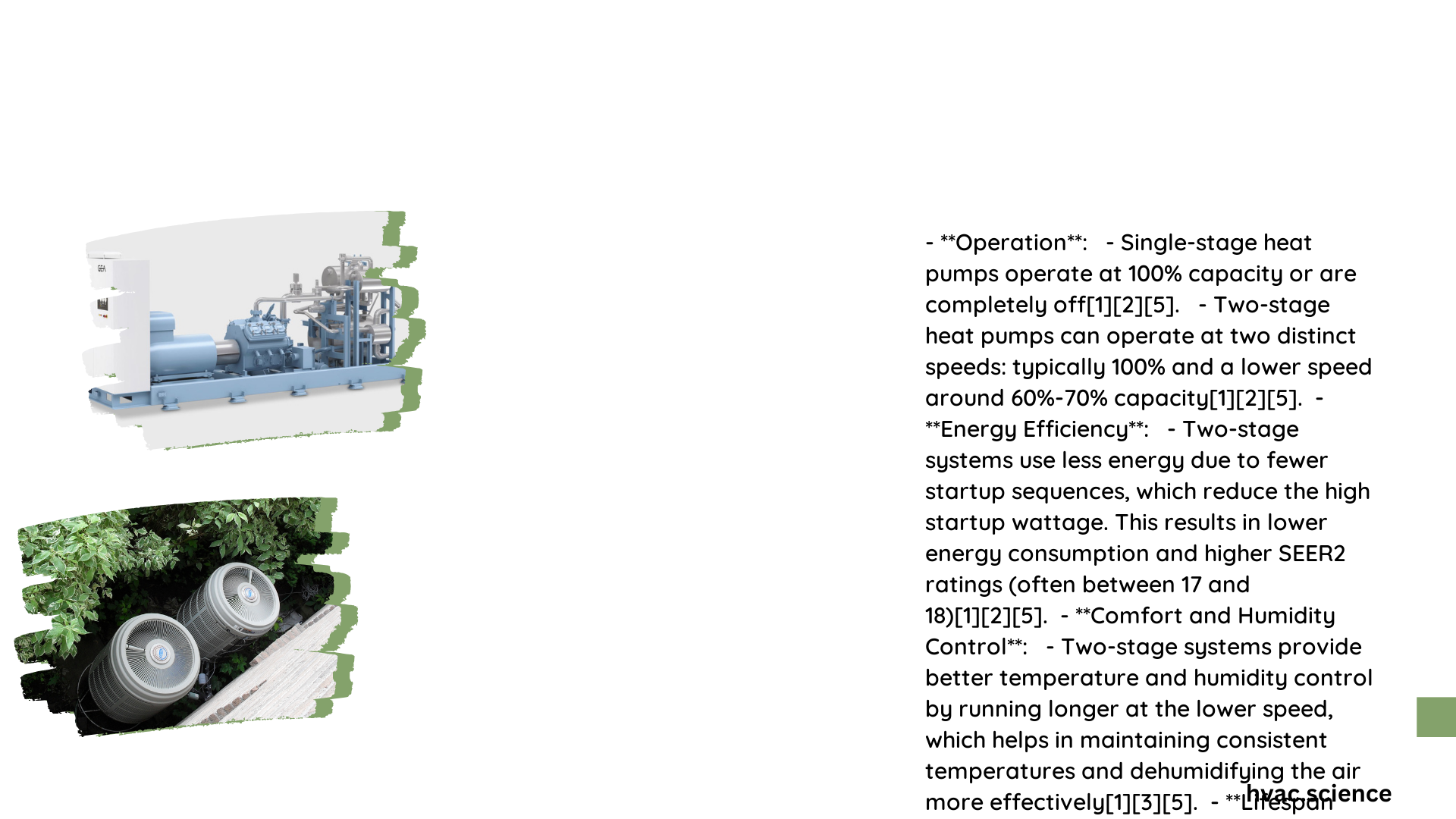The main difference between single stage and two stage heat pumps lies in their operational efficiency, cost, noise levels, and performance variability. Single stage heat pumps operate at a fixed capacity with lower efficiency ratings, while two stage heat pumps offer two levels of operation, providing higher efficiency and more consistent comfort. This article explores these differences in detail, helping you make an informed decision for your heating and cooling needs.
What Are the Key Operational Differences?
Single stage and two stage heat pumps differ significantly in their operational characteristics:
Single Stage Heat Pumps:
- Operate at full capacity or not at all
- Lower SEER (Seasonal Energy Efficiency Ratio) and HSPF (Heating Seasonal Performance Factor) ratings
- Typical SEER: 13-15
- Typical HSPF: 7-8
- More frequent cycling, especially in mild weather
Two Stage Heat Pumps:
- Operate at two levels: high stage (100% capacity) and low stage (65-70% capacity)
- Higher SEER and HSPF ratings
- Typical SEER: 16 or higher
- Typical HSPF: 9 or higher
- Longer run times at lower capacity, improving efficiency
How Do the Costs Compare?

The cost difference between single stage and two stage heat pumps is significant:
Initial Installation Costs:
- Single Stage: $12,000 – $20,000
- Two Stage: $15,000 – $30,000 or more
Maintenance Expenses:
- Single Stage: Generally higher due to more wear and tear
- Two Stage: Often lower due to higher quality parts and better warranties
Long-Term Energy Savings:
- Two stage heat pumps typically offer more significant energy savings over time
- Exact savings depend on climate, usage, and system efficiency
What Are the Noise Level Differences?
Noise levels can vary significantly between single stage and two stage heat pumps:
Single Stage Heat Pumps:
- Tend to be noisier due to on/off operation
- Louder start-up and shutdown cycles
- Typical noise level: Around 60 decibels or higher
Two Stage Heat Pumps:
- Generally quieter due to longer operation at lower speeds
- Often include advanced sound insulation features
- Can operate at sound levels as low as 40 decibels
How Does Performance Variability Affect Comfort?
The performance variability between single stage and two stage heat pumps directly impacts comfort levels:
Single Stage Heat Pumps:
- Can cause temperature fluctuations
- Shorter run times and more frequent cycling
- Less effective humidity control
Two Stage Heat Pumps:
- Provide more consistent indoor temperatures
- Longer run times at lower capacities
- Better humidity removal and overall comfort
What Are the Efficiency Ratings to Consider?
When comparing single stage and two stage heat pumps, efficiency ratings are crucial:
| Rating | Single Stage | Two Stage |
|---|---|---|
| SEER | 13-15 | 16+ |
| HSPF | 7-8 | 9+ |
Higher ratings indicate better energy efficiency during both cooling and heating seasons.
How Do Climate Conditions Affect the Choice?
The choice between single stage and two stage heat pumps can be influenced by climate conditions:
- In regions with extreme temperature fluctuations, two stage heat pumps often perform better
- For mild climates, the energy savings from a two stage heat pump might take longer to offset the higher upfront cost
- Single stage heat pumps may struggle in climates with significant temperature variations
What Are the Long-Term Considerations?
When deciding between single stage and two stage heat pumps, consider these long-term factors:
- Energy Savings: Two stage heat pumps generally offer greater long-term energy savings
- Comfort Levels: Two stage systems provide more consistent comfort
- Maintenance Costs: Single stage systems may require more frequent maintenance
- System Lifespan: Two stage systems often have longer lifespans due to reduced wear and tear
- Environmental Impact: Higher efficiency of two stage systems can lead to reduced carbon footprint
In conclusion, while single stage heat pumps offer a lower upfront cost, two stage heat pumps provide better efficiency, comfort, and potentially lower long-term costs. The choice ultimately depends on your specific needs, budget, and climate conditions.
